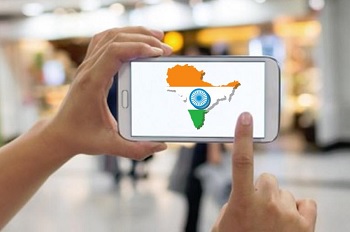Retailers are choosing to abandon their conventional e-commerce websites in favor of apps
Mobile shopping is becoming more common in India, but some consumers are not convinced that retailers should abandon their websites for an app-only approach. This is the case with Myntra and Flipkart, two of the largest e-commerce entities in the country. Both companies are opting to push shopping from a mobile application, choosing to abandon their websites altogether. While shopping on a mobile app may be considered convenient for consumers, removing the options that these consumers have may be a problem.
Apps may be making it less convenient to shop from a mobile device
Young consumers have shown a great deal of enthusiasm when it comes to mobile commerce. These people tend to spend a significant portion of their time on the Internet, using a wide variety of apps to interact with others and for the sake of entertainment. They also make use of mobile apps to do their shopping, but they also visit e-commerce sites directly, either with their desktop computers or mobile devices. As retailers begin abandoning their websites, consumers are finding it harder to shop online.
Mobile shopping apps tend to lack the functionality of e-commerce websites
 Mobile shopping apps can be convenient, but they often lack the selection of products that can be found on conventional e-commerce sites. Apps also do not support large pictures, which can make it more difficult for consumers to see the products that they are interested in. There are also functionality issues with applications that can make shopping from a mobile device more complicated than it is meant to be. While websites are not perfect, they may offer consumers more options when it comes to shopping, especially when it comes to product selection.
Mobile shopping apps can be convenient, but they often lack the selection of products that can be found on conventional e-commerce sites. Apps also do not support large pictures, which can make it more difficult for consumers to see the products that they are interested in. There are also functionality issues with applications that can make shopping from a mobile device more complicated than it is meant to be. While websites are not perfect, they may offer consumers more options when it comes to shopping, especially when it comes to product selection.
Mobile shopping is gaining traction throughout India
Despite the problems of mobile apps, mobile commerce continues to thrive in India. More consumers are choosing to shop online with their smartphones and tablets than ever before. This trend is expected to continue gaining momentum over the next several years, making India one of the leasing mobile commerce markets in the world.
The handmade cosmetics retailer has been a holdout until now but has finally created a scent and mood application.
Cosmetics retailer, Lush, which is best known for its handmade products, has finally taken its very first steps into the m-commerce sphere with the launch of a new mobile app for iOS devices that gives shoppers the ability to browse through its items based on their mood or a fragrance they like.
The design of the app was meant to focus on the sensory experience of their various retail offerings.
The m-commerce app gives users the chance to search and browse through categories based on a number of different factors, including the scent, feel, and mood of a given product. Each of the products is then displayed in styles and colors that are detailed and rich. Next to the name of each product on its individual description page is a complete list of all of the ingredients that it contains, as well as high resolution videos and pictures.
In order to create the m-commerce app, Lush worked alongside the ustwo digital product studio.
 The digital product owner at Lush, Adam Goswell, explained that “Working in such close collaboration with ustwo gave us the opportunity to create something really great together, that benefits from ustwo’s experience in delivering great mobile experiences coupled with the brand knowledge and design/creative input from Lush – it made for a formidable team.”
The digital product owner at Lush, Adam Goswell, explained that “Working in such close collaboration with ustwo gave us the opportunity to create something really great together, that benefits from ustwo’s experience in delivering great mobile experiences coupled with the brand knowledge and design/creative input from Lush – it made for a formidable team.”
The lead designer at ustwo, Dev Morgan added that it was challenging to be able to organize such a vast selection of varied content for the mobile commerce channel. They, therefore, used native code processing power in order to “incorporate cues from the current website,” so that it became possible for them to be able to accomplish and display a great deal more.
Goswell and Morgan will be looking to broaden the m-commerce app across the international markets at Lush over the next twelve months, but both companies have expressed their happiness and excitement over their first foray into the mobile marketplace. The cosmetics retailer may have taken its time in stepping into the smartphone based shopping ecosystem, but now that they have done it, they have made certain to do it in a way that reflects their brand.
 Mobile shopping apps can be convenient, but they often lack the selection of products that can be found on conventional e-commerce sites. Apps also do not support large pictures, which can make it more difficult for consumers to see the products that they are interested in. There are also functionality issues with applications that can make shopping from a mobile device more complicated than it is meant to be. While websites are not perfect, they may offer consumers more options when it comes to shopping, especially when it comes to product selection.
Mobile shopping apps can be convenient, but they often lack the selection of products that can be found on conventional e-commerce sites. Apps also do not support large pictures, which can make it more difficult for consumers to see the products that they are interested in. There are also functionality issues with applications that can make shopping from a mobile device more complicated than it is meant to be. While websites are not perfect, they may offer consumers more options when it comes to shopping, especially when it comes to product selection.
 The digital product owner at Lush, Adam Goswell, explained that “Working in such close collaboration with ustwo gave us the opportunity to create something really great together, that benefits from ustwo’s experience in delivering great mobile experiences coupled with the brand knowledge and design/creative input from Lush – it made for a formidable team.”
The digital product owner at Lush, Adam Goswell, explained that “Working in such close collaboration with ustwo gave us the opportunity to create something really great together, that benefits from ustwo’s experience in delivering great mobile experiences coupled with the brand knowledge and design/creative input from Lush – it made for a formidable team.”